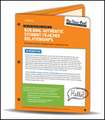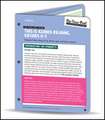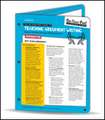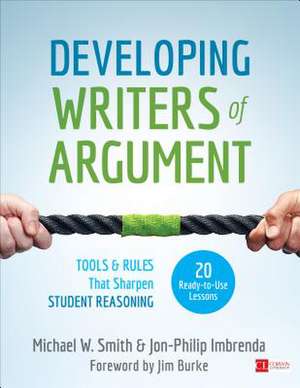Developing Writers of Argument: Tools and Rules That Sharpen Student Reasoning: Corwin Literacy
Autor Michael W. Smith, Jon-Philip Imbrendaen Limba Engleză Paperback – 19 apr 2018
Din seria Corwin Literacy
-
 Preț: 285.18 lei
Preț: 285.18 lei -
 Preț: 158.08 lei
Preț: 158.08 lei -
 Preț: 278.39 lei
Preț: 278.39 lei -
 Preț: 243.82 lei
Preț: 243.82 lei -
 Preț: 244.25 lei
Preț: 244.25 lei -
 Preț: 88.42 lei
Preț: 88.42 lei -
 Preț: 273.64 lei
Preț: 273.64 lei -
 Preț: 274.70 lei
Preț: 274.70 lei -
 Preț: 200.91 lei
Preț: 200.91 lei -
 Preț: 248.26 lei
Preț: 248.26 lei -
 Preț: 284.26 lei
Preț: 284.26 lei -
 Preț: 294.79 lei
Preț: 294.79 lei -
 Preț: 281.36 lei
Preț: 281.36 lei -
![Mindsets and Moves: Strategies That Help Readers Take Charge [Grades K-8]](https://i3.books-express.ro/bs/9781506314938/mindsets-and-moves.jpg) Preț: 156.17 lei
Preț: 156.17 lei -
 Preț: 283.27 lei
Preț: 283.27 lei -
 Preț: 88.42 lei
Preț: 88.42 lei -
 Preț: 281.94 lei
Preț: 281.94 lei -
 Preț: 248.26 lei
Preț: 248.26 lei -
 Preț: 278.64 lei
Preț: 278.64 lei -
 Preț: 267.50 lei
Preț: 267.50 lei -
 Preț: 237.15 lei
Preț: 237.15 lei -
 Preț: 270.76 lei
Preț: 270.76 lei -
![Comprehension [Grades K-12]: The Skill, Will, and Thrill of Reading](https://i3.books-express.ro/bs/9781071812839/comprehension-grades-k-12.jpg) Preț: 287.79 lei
Preț: 287.79 lei -
 Preț: 278.10 lei
Preț: 278.10 lei -
 Preț: 245.45 lei
Preț: 245.45 lei -
 Preț: 204.26 lei
Preț: 204.26 lei -
 Preț: 272.62 lei
Preț: 272.62 lei -
![Every Minute Matters [Grades K-5]: 40+ Activities for Literacy-Rich Classroom Transitions](https://i4.books-express.ro/bs/9781544382449/every-minute-matters-grades-k-5.jpg) Preț: 193.61 lei
Preț: 193.61 lei -
 Preț: 274.00 lei
Preț: 274.00 lei -
![Flash Feedback [Grades 6-12]: Responding to Student Writing Better and Faster – Without Burning Out](https://i4.books-express.ro/bs/9781544360492/flash-feedback-grades-6-12.jpg) Preț: 232.71 lei
Preț: 232.71 lei -
 Preț: 88.67 lei
Preț: 88.67 lei -
 Preț: 147.92 lei
Preț: 147.92 lei -
 Preț: 273.44 lei
Preț: 273.44 lei -
 Preț: 184.56 lei
Preț: 184.56 lei -
 Preț: 88.67 lei
Preț: 88.67 lei -
 Preț: 236.11 lei
Preț: 236.11 lei -
 Preț: 209.15 lei
Preț: 209.15 lei -
 Preț: 256.83 lei
Preț: 256.83 lei -
 Preț: 291.04 lei
Preț: 291.04 lei -
 Preț: 288.67 lei
Preț: 288.67 lei -
 Preț: 273.44 lei
Preț: 273.44 lei -
 Preț: 278.10 lei
Preț: 278.10 lei -
 Preț: 174.52 lei
Preț: 174.52 lei -
 Preț: 244.44 lei
Preț: 244.44 lei -
![Mentor Texts That Multitask [Grades K-8]: A Less-Is-More Approach to Integrated Literacy Instruction](https://i3.books-express.ro/bs/9781071836132/mentor-texts-that-multitask-grades-k-8.jpg) Preț: 241.23 lei
Preț: 241.23 lei -
 Preț: 140.61 lei
Preț: 140.61 lei -
 Preț: 216.22 lei
Preț: 216.22 lei -
 Preț: 218.84 lei
Preț: 218.84 lei -
 Preț: 277.50 lei
Preț: 277.50 lei -
 Preț: 273.44 lei
Preț: 273.44 lei
Preț: 188.59 lei
Preț vechi: 246.60 lei
-24% Nou
Puncte Express: 283
Preț estimativ în valută:
36.09€ • 37.78$ • 29.86£
36.09€ • 37.78$ • 29.86£
Carte indisponibilă temporar
Doresc să fiu notificat când acest titlu va fi disponibil:
Se trimite...
Preluare comenzi: 021 569.72.76
Specificații
ISBN-13: 9781506354330
ISBN-10: 1506354335
Pagini: 184
Dimensiuni: 216 x 279 x 22 mm
Greutate: 0.52 kg
Ediția:1
Editura: SAGE Publications
Colecția Corwin
Seria Corwin Literacy
Locul publicării:Thousand Oaks, United States
ISBN-10: 1506354335
Pagini: 184
Dimensiuni: 216 x 279 x 22 mm
Greutate: 0.52 kg
Ediția:1
Editura: SAGE Publications
Colecția Corwin
Seria Corwin Literacy
Locul publicării:Thousand Oaks, United States
Recenzii
“Smith and Imbrenda care about deep and meaningful learning. In this book, they show how argument can be taught in ways that develop tremendous engagement and deep understanding through a process that is in service of critical literacy and social imagination and responsibility. There are a lot of books about argument out there. I’d argue that this one is the best and most transformative I’ve ever read. The ‘so what’ lessons on reasoning/warranting alone will transform your teaching of argument and of much else.”
“I was impressed with how Smith and Imbrenda's approach helped students who are usually passive learners become so engaged in discussions about readings. Our test scores reflected that passion.”
“In just a few weeks, Smith and Imbrenda's approach to instruction transformed my classroom. My students and I became passionate about our reading, writing, and discussions; our state assessment scores went up. This stuff works. I wish I had known about it my whole career.”
“Developing Writers of Argument is not only a practical guide for teaching students, but also a practical guide for educating teachers in the art of argument made simple. Instead of throwing the baby out with the bathwater, the authors draw upon years of research-based strategies and methodologies to make lessons real and relevant for today’s learner. Reading the lessons provided me that 'ah ha' moment and helped me to internalize the need for the three Rs (relevance, responsibility, and respect) in teaching and learning.”
“I was impressed with how Smith and Imbrenda's approach helped students who are usually passive learners become so engaged in discussions about readings. Our test scores reflected that passion.”
“In just a few weeks, Smith and Imbrenda's approach to instruction transformed my classroom. My students and I became passionate about our reading, writing, and discussions; our state assessment scores went up. This stuff works. I wish I had known about it my whole career.”
“Developing Writers of Argument is not only a practical guide for teaching students, but also a practical guide for educating teachers in the art of argument made simple. Instead of throwing the baby out with the bathwater, the authors draw upon years of research-based strategies and methodologies to make lessons real and relevant for today’s learner. Reading the lessons provided me that 'ah ha' moment and helped me to internalize the need for the three Rs (relevance, responsibility, and respect) in teaching and learning.”
Cuprins
Foreword by Jim Burke
Acknowledgments
PART I. THE ARGUMENT FOR ARGUMENT
Chapter 1. Introduction
Argument Cultivates Critical Thinking
Argument Fosters Collaborative Reasoning
Argument Promotes a Sense of Social Responsibility
What This Book Can Offer
Chapter 2. A Classroom Culture of Argumentation
Revisiting the Three R’s
Conversation as a Metaphor for Learning
Staging Conversations in Your Classroom
So What, Exactly, Is an Argument, Anyway?
Chapter 3. Our Instructional Approach
Transferable Classroom Tools
So Do They Work?
PART II. LESSONS
Chapter 4. Everyday Arguments
Introducing the Elements of Argument
Lesson 1: Apple Music vs. Spotify
Lesson 2: Taco Bell vs. Chipotle
Lesson 3: Who Is the Better Superhero?
Lesson 4: Which Video Streaming Service Is the Best?
Lesson 5: Heinz’s Dilemma
Lesson 6: To What Extent Am I Responsible to Others?
Chapter 5. Practicing Three Elements of Argument
Lesson 7: Crafting Controversial Claims
Lesson 8: What Makes an Effective Claim?
Lesson 9: What Makes Effective Data? Part 1
Lesson 10: What Makes Effective Data? Part 2
Lesson 11: How Do Warrants Relate to Claims and Data?
Lesson 12: Practice Writing Warrants
Chapter 6. Applying What They’ve Learned About Argument to Texts
Lesson 13: Who Is Going to Bounce Back?
Lesson 14: Using Three Key Questions to Understand a Poem
Lesson 15: Applying What We’ve Learned to a Literary Argument
Lesson 16: Learning the Reader’s Rule of Rupture
Lesson 17: Applying Argumentative Strategies to Respond to a Well-Known Theory
Lesson 18: Bringing Together All of the Elements of Argument: The Minnesota Twins Study
Chapter 7. Putting It All Together: Applying Argument to Life Choices
Lesson 19: Should I Choose a 2-Year or 4-Year College?
Lesson 20: What Career Has the Best Potential for Me?
Chapter 8. How to Use This Book
Using the Lessons Directly
Using the Tools
Using Our Lessons as Templates
References
Index
Acknowledgments
PART I. THE ARGUMENT FOR ARGUMENT
Chapter 1. Introduction
Argument Cultivates Critical Thinking
Argument Fosters Collaborative Reasoning
Argument Promotes a Sense of Social Responsibility
What This Book Can Offer
Chapter 2. A Classroom Culture of Argumentation
Revisiting the Three R’s
Conversation as a Metaphor for Learning
Staging Conversations in Your Classroom
So What, Exactly, Is an Argument, Anyway?
Chapter 3. Our Instructional Approach
Transferable Classroom Tools
So Do They Work?
PART II. LESSONS
Chapter 4. Everyday Arguments
Introducing the Elements of Argument
Lesson 1: Apple Music vs. Spotify
Lesson 2: Taco Bell vs. Chipotle
Lesson 3: Who Is the Better Superhero?
Lesson 4: Which Video Streaming Service Is the Best?
Lesson 5: Heinz’s Dilemma
Lesson 6: To What Extent Am I Responsible to Others?
Chapter 5. Practicing Three Elements of Argument
Lesson 7: Crafting Controversial Claims
Lesson 8: What Makes an Effective Claim?
Lesson 9: What Makes Effective Data? Part 1
Lesson 10: What Makes Effective Data? Part 2
Lesson 11: How Do Warrants Relate to Claims and Data?
Lesson 12: Practice Writing Warrants
Chapter 6. Applying What They’ve Learned About Argument to Texts
Lesson 13: Who Is Going to Bounce Back?
Lesson 14: Using Three Key Questions to Understand a Poem
Lesson 15: Applying What We’ve Learned to a Literary Argument
Lesson 16: Learning the Reader’s Rule of Rupture
Lesson 17: Applying Argumentative Strategies to Respond to a Well-Known Theory
Lesson 18: Bringing Together All of the Elements of Argument: The Minnesota Twins Study
Chapter 7. Putting It All Together: Applying Argument to Life Choices
Lesson 19: Should I Choose a 2-Year or 4-Year College?
Lesson 20: What Career Has the Best Potential for Me?
Chapter 8. How to Use This Book
Using the Lessons Directly
Using the Tools
Using Our Lessons as Templates
References
Index
Notă biografică
Michael W. Smith, a professor in Temple University¿s College of Education, joined the ranks of college teachers after eleven years of teaching high school English. His research focuses on understanding both how adolescents and adults engage with texts outside school and how teachers can use those understandings to devise more motivating and effective instruction inside schools.
Descriere
Forming effective arguments is essential to students' success in academics and in life. This book's engaging lessons offer an innovative approach to teaching this critical and transferable skill.
